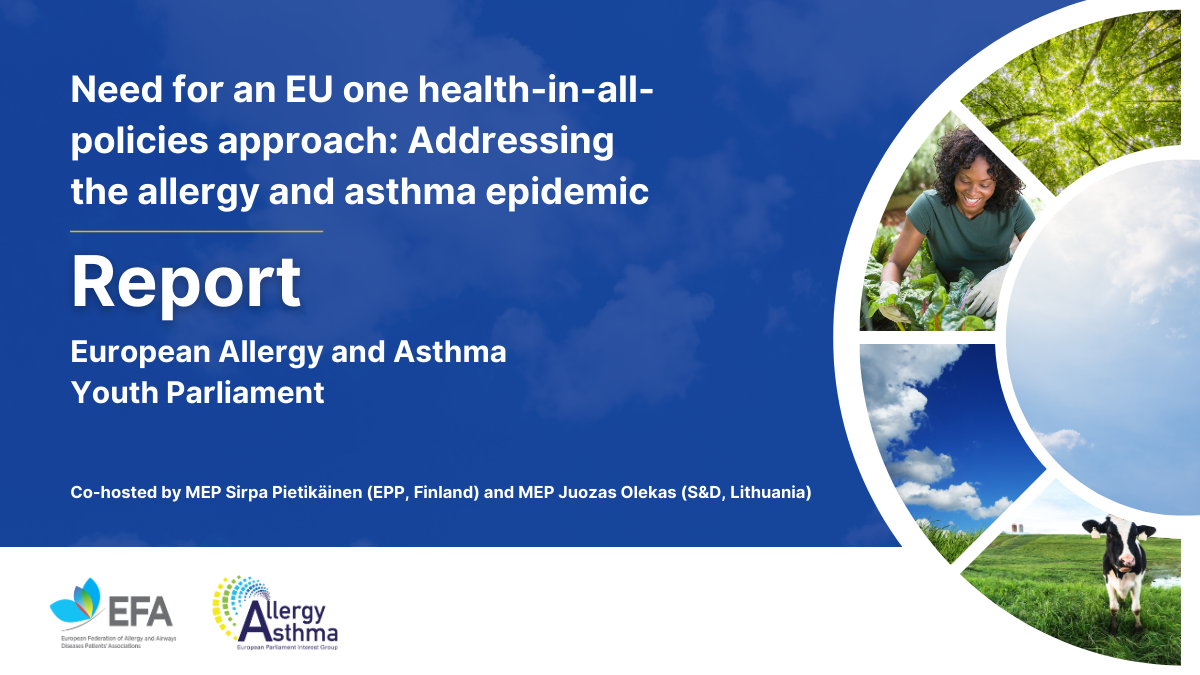Bioaerosols are major environmental pollutants that impact human health and the environment. In its event “Need for an EU One Health-in-all policies approach: addressing the allergy and asthma epidemic”, the European Allergy and Asthma Interest Group dives into a discussion on the European legislative framework on bioaerosol pollutants, research on the effects of pollen on health, and the need for better information. Read the joint statement to address allergy and asthma pandemic and the main takeaways of the roundtable discussion.
On 4 July 2023, the European Parliament Interest Group on Allergy & Asthma held the policy event “Need for an EU One Health-in-all policies approach: addressing the allergy and asthma epidemic”, co-hosted by the Chair of the Group MEP Sirpa Pietikäinen (EPP, Finland) and Vice-Chair MEP Juozas Olekas (S&D, Lithuania) to take a deep dive into the impact of bioaerosols on human health.
Bioaerosols (including aeroallergens such as pollen, fungal spores) are fundamental to life on Earth. But their activity also impacts human health and is typically linked with major chronic diseases such as allergy and asthma. For this reason, there is a need for a comprehensive and interdisciplinary One Health approach on the European level to address the challenges associated with bioaerosols.
With over 100 million Europeans living with allergic rhinitis and/or asthma, these are the most common non-communicable diseases among children and the second most common among adults. The direct and indirect costs of the disease are calculated between €50 and 150 billion annually.
As human health is tightly interconnected with the health of the environment and animals, the ‘One Health’ approach focuses on prevention and monitoring and requires a strong sense of policy coherence to be applied successfully. And the case of bioaerosols is not an exception.
MEP Juozas Olekas, in his opening remarks, “Bioaerosols have a huge impact on human health not only impacting lives of allergy and asthma patients but also agriculture, destroying crops and causing environmental damage. Climate change has already influenced the lives of allergy patients contributing to earlier and longer pollen seasons and increased aeroallergy concentration”. Therefore, including bioaerosols in relevant European legislation would entail multiple benefits: better information, improved quality of life, the protection of biodiversity but also saving millions of euros that are paid in healthcare per year.
‘Need for an EU One Health-in-all policies approach: addressing the allergy and asthma epidemic’
Explore the technological advances around bioaerosols and the foundations for EU One Health-in-all-policies in the replay of the event. Read the full report on the discussion of the event here.
The event examined the huge impact of bioaerosols on human health. The discussion revolved around the innovative ways to study, monitor and communicate the presence of bioaerosols in the air. Speakers focused on the practical applications of high-level scientific results in regulations for the benefit of human health.
EU One Health– in–all policies, allergy and asthma
Bioaerosols are essential in nature as they serve biological reproduction and participate in the process of cloud formation and precipitations. However, exposure to bioaerosols undermines our immune systems, leading to allergy, respiratory diseases, infections, fatigue, etc. Addressing the challenges associated with bioaerosols requires a comprehensive and interdisciplinary One Health approach and therefore, a collaboration between public health officials, environmental scientists, veterinarians, and other relevant stakeholders.
Patients’ viewpoint: disease prevention, burden, and information gaps
The increasing allergy and asthma prevalence, ever-rising temperatures, and the expansion of allergenic species are the underlying effects of the impact bioaerosols have on the European population. As pollen allergy often starts in childhood, it has a debilitating impact, affecting the quality of life as a whole during the life course. Moreover, pollen is linked with increased socioeconomic costs, leading to overall costs of approximately 7.4 billion EUR per year in Europe. These prevalence projections call for EU-wide action.
What are the next steps?
As part of the One-Health-in-all Policies approach event, the organisers launched a Joint Statement on the need to address the allergy and asthma pandemic.
The co-signatories recommend EU policymakers the following:
- to improve the legislative framework to include monitoring of semi-natural pollutants such aeroallergens (pollen and fungal spores) in the EU legislation;
- to develop open and trusted communication channels (e.g. through CAMS), that provide reliable, accurate and timely information about aeroallergen concentrations in real time;
- to encourage further research on the effects of pollen and spores on health, including in the presence of other pollutants, based on the new data these efforts will provide;
- to facilitate the development of technology and infrastructure to further extend applications of bioaerosols monitoring and forecasting.
Such measures will help to reduce the disease burden and health inequalities, reduce agricultural losses and environmental damage, and improve our understanding of the complex relationship between exposure, climate, and One Health.
Read the full joint statement here.
